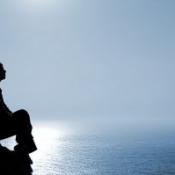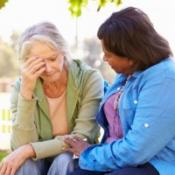Am I Horrible for Not Crying at My Father’s Funeral?
Dear GoodTherapy.org,
I recently attended my father’s funeral, which was a very large gathering with family, friends, and people in the community. He touched many lives and was well-known around town, so hundreds of people showed up to pay respects. Tears were shed, handshakes and hugs were exchanged, and memories were shared. It was an emotional day, to say the least … but I didn’t even come close to crying. In fact, I haven’t cried at all since he passed. I’ve tried, because it seems like the thing to do, and because people have been telling me things like, “You just have to let it out,” or, “You’ll feel so much better afterward.”
In general I don’t consider myself a very emotional person, though I’ve been known to shed a tear at sad movies. And I cried when my childhood dog died in my 20s. So it makes me feel even worse that I was able to express some emotion at those times and not now, at a clearly more impactful loss. And it’s not like I hated my dad, either. We’d grown apart in recent years, but I have positive memories from my childhood when my dad was around and not away for military service, as he often was.
My two siblings are grieving in “normal” ways, and they definitely think I’m some kind of monster for not crying at all, especially at the funeral. Meanwhile, I’ve been the one with a clear head on my shoulders to help our mother arrange the memorial, get her finances in order, etc. So at least some good has come out of my apathy. But I do wonder why I’m not reacting more strongly, and whether I should be doing something to make myself move through grief more.
Would it be helpful to try to make myself cry? Does crying need to be a part of grief? I don’t want to draw the grief process out unnecessarily if I can instead just move forward. —Dried Up
Submit Your Own Question to a Therapist
Dear Dried Up,
A parent’s passing can be a momentous time in one’s life—and assuming we know and outlive them, we all experience it eventually. Each of us will react in our own way. That means we will cry or not, feel sad or not, feel free or not, feel glad or not. Whatever our feelings or, more accurately, mixture of our feelings, we will be affected—some people more, some less, some more openly expressive, some less. That’s all part of being human.
You dubbed yourself “Dried Up.” I was surprised when I read that. What does it mean? Then I thought, “dried up” implies that what was wet before is dry now. I wonder if there were times in your early life when you were unhappy, and now you’ve reached equilibrium.
You write that you cried when your dog died and you also cry at certain movies. Some movies are arranged to make people cry; that’s their purpose. And when your dog died, you were in your 20s, a time when people start truly becoming adults. Although I don’t know you well enough to unravel what made you who you are, it’s certainly possible your dog’s death may have been associated with the end of your childhood. If so, you may have cried both for the dog and also that it marked the ending of a precious time in your life.
Now that your father has died, you wonder why you don’t cry. You wonder if there is something wrong with you, perhaps. That presumes that crying is not only normal, but mandatory.
Who says you have to cry? Every person experiences grief in their own way and in their own time. Everybody expresses their emotions differently, and there is no right way to do it.
Who says you have to cry? Every person experiences grief in their own way and in their own time. Everybody expresses their emotions differently, and there is no right way to do it. It’s a purely individual matter. You write that you are generally reserved emotionally—that’s neither a positive nor a negative attribute, but rather a description of your place on a continuum of emotional expressiveness. Some people are more openly expressive, some less, just like some folks have brown eyes and others have blue eyes.
Your siblings seem to have precise ideas about the right and wrong ways to have feelings and subsequently show them. I wonder if this is not part of a larger story about how you relate to one another. They are not pleased with you because you did not display grief as they did. Do you all have to be the same? Is there only one way to be?
You speak of your apathy. I’m not sure I understand what you mean by that, and I wonder if you might mean impassivity rather than apathy, so I looked up apathy in the dictionary. Merriam-Webster differentiates apathy from impassivity: “Impassivity stresses the absence of any external sign of emotion in action or facial expression.” What’s wrong with that?
I definitely do not think you should make yourself cry. You shouldn’t make yourself do anything. Just be yourself and let things take their natural course.
Take care,
Lynn
- 9 comments
- Leave a Comment
Jennifer
August 6th, 2016 at 7:41 AMYou have to do things in ways that feel the most right to you. If you are not ready to cry yet, there will probably come a time when you are and this is why grief is such a personal process for everyone.
Beau
August 6th, 2016 at 11:35 AMI am sort of the same way, you know, the person who laughs out of nervous anxiety? That’s me, the worst times is when it happens to me but I can’t ever control it.
Lora
August 8th, 2016 at 4:33 PMIt would just not feel any more genuine if you had to resort to “making” yourself cry.
So you may not be the person who shows every single emotion. I’m that way too, I might be more likely to cry when I am all alone than I ever would be in public.
To me it doesn’t feel comfortable to show emotion like that openly.
Leave a Comment
By commenting you acknowledge acceptance of GoodTherapy.org's Terms and Conditions of Use.


 It's OK Not to Cry: A Reflection on Grief
It's OK Not to Cry: A Reflection on Grief  Can I Grieve If Nobody Died?
Can I Grieve If Nobody Died?  Grieving on the Job: Navigating Professional Life Amid Grief
Grieving on the Job: Navigating Professional Life Amid Grief 
